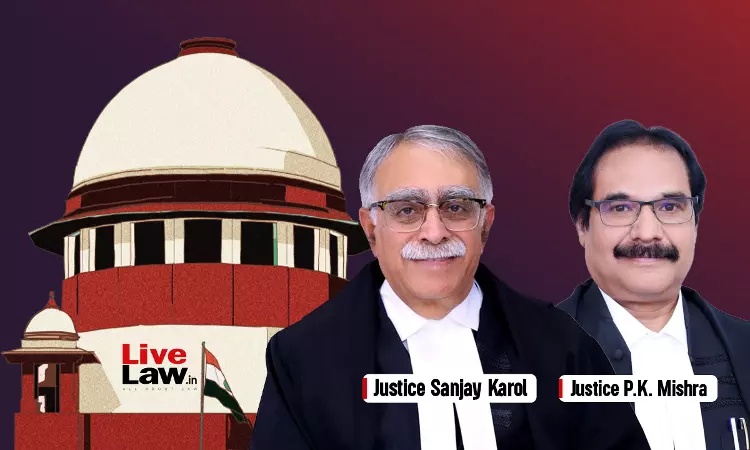- Home
- /
- Supreme court
- /
- Supreme Court Summarises Principles...
Supreme Court Summarises Principles Regarding Appeals Against Grant Of Bail
Yash Mittal
15 Aug 2025 10:45 AM IST
The Supreme Court on Wednesday (Aug. 13) while setting aside Olympian Wrestler Sushil Kumar's bail in the Sagar Dhankhar murder case, had laid down the principles regarding the appeal against the grant of bail, stating that the appeal against the grant of bail and cancellation of bail are different concepts as both involve different parameters. The Court held that an appeal against the grant...
The Supreme Court on Wednesday (Aug. 13) while setting aside Olympian Wrestler Sushil Kumar's bail in the Sagar Dhankhar murder case, had laid down the principles regarding the appeal against the grant of bail, stating that the appeal against the grant of bail and cancellation of bail are different concepts as both involve different parameters.
The Court held that an appeal against the grant of bail can be entertained by a superior court if its shown that the bail order was passed without taking into relevant factors such gravity of offence, impact of crime, the order being illegal, perverse, possibility of influencing the witnesses, etc. However, the same grounds cannot be urged while applying for cancellation of bail, as for bail cancellation it needs to be looked upon supervening circumstances or any violation of the conditions of bail imposed on the person who has been accorded such a relief, such as the conduct of the accused subsequent to grant of bail cannot be urged in an appeal against the bail order, but in application seeking bail cancellation.
The bench comprising Justices Sanjay Karol and Prashant Kumar Mishra issued the following principles regarding the appeal against the grant of bail:
(i) An appeal against grant of bail cannot be considered to be on the same footing as an application for cancellation of bail;
(ii) The Court concerned must not venture into a threadbare analysis of the evidence adduced by prosecution. The merits of such evidence must not be adjudicated at the stage of bail;
(iii) An order granting bail must reflect application of mind and assessment of the relevant factors for grant of bail that have been elucidated by this Court. [See: Y v. State of Rajasthan (Supra); Jaibunisha v. Meherban & Ors. and Bhagwan Singh v. Dilip Kumar @ Deepu]
(iv) An appeal against grant of bail may be entertained by a superior Court on grounds such as perversity; illegality; inconsistency with law; relevant factors not been taken into consideration including gravity of the offence and impact of the crime;
(v) However, the Court may not take the conduct of an accused subsequent to the grant bail into consideration while considering an appeal against the grant of such bail. Such grounds must be taken in an application for cancellation of bail; and
(vi) An appeal against grant of bail must not be allowed to be used as a retaliatory measure. Such an appeal must be confined only to the grounds discussed above.
The judgment authored by Justice Karol referred to the recent case of Ajwar v. Waseem and Anr. 2024 LiveLaw (SC) 392 where it was held that even non-misuse of bail conditions by the accused can lead to setting aside of the bail order, if the bail order was not passed taking into relevant factors such as “the nature of the accusations made against the accused, the manner in which the crime is alleged to have been committed, the gravity of the offence, the role attributed to the accused, the criminal antecedents of the accused, the probability of tampering of the witnesses and repeating the offence, if the accused are released on bail, the likelihood of the accused being unavailable in the event bail is granted, the possibility of obstructing the proceedings and evading the courts of justice and the overall desirability of releasing the accused on bail.”
Applying the law, the Court held that the High Court erroneously passed an order releasing Kumar on bail as the High Court erred in not considering the "grievous nature of the crime, the possibility of influencing the trial by the Accused and the conduct of the accused during investigation.”, the court said.
“Undoubtedly, the Accused is a celebrated wrestler and an Olympian, who has represented the nation at the international level. It cannot be doubted that he carries societal impact. In such circumstances, it cannot be said that he would have no domineering influence over witnesses or delay the proceedings of trial. Needless to add that allegations of pressurizing the witnesses have been made, before the order granting bail was passed. Certain witnesses had, in writing lodged complaints, apprehending threat to their lives at the behest of the Accused.”, the court added, referring to Bhagwan Singh v. Dilip Kumar, 2023 LiveLaw (SC) 707.
Case : ASHOK DHANKAD Versus STATE NCT OF DELHI AND ANR | SLP(Crl) No. 5370/2025
Citation : 2025 LiveLaw (SC) 797
Click here to read the judgment
Appearance:
For Petitioner(s) : Mr. Siddharth Mridul, Sr. Adv. Ms. Joshini Tuli, Adv. Mr. Joginder Tuli, Adv. Mr. Ishaan Kapoor, Adv. Mrs. Gargi Khanna, AOR Ms. Minnat Ullah, Adv. Ms. Madhurima Mridul, Adv. Mr. Deepak Chhikara, Adv. Mr. Sohil Batra, Adv. Ms. Taniya Qureshi, Adv. Ms. Sonu Kumari, Adv.
For Respondent(s) : Mr. Vikramjit Banerjee, A.S.G. Mr. Mukesh Kumar Maroria, AOR Mr. Amit Sharma-b, Adv. Mr. Prakash Gautam, Adv. Mr. Shubhendu Anand, Adv. Mr. Alabhya Damija, Adv. Mr. Mahesh Jethmalani, Sr. Adv. Mr. Ravi Sharma, AOR Mr. Sumit Shokeen, Adv. Mr. Anjani Kumar Rai, Adv. Mr. Vaibhav Thaledi, Adv.



